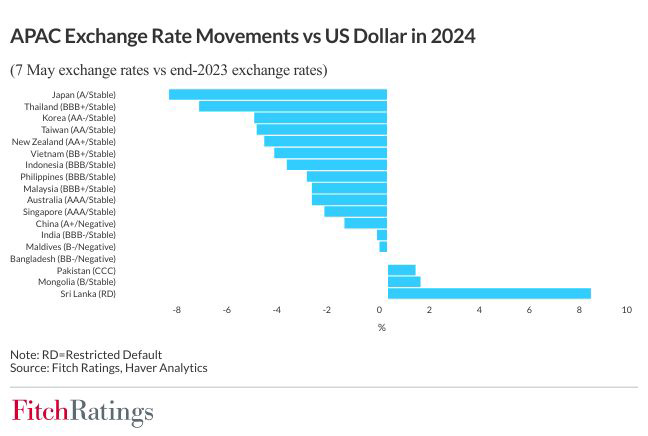May, 14, 2024

Fitch Ratings: Fitch Ratings believes that policies designed to support exchange rates are unlikely to pose significant near-term risks to the credit profiles of APAC investment-grade sovereigns, but any deterioration of official reserve buffers could pose greater risks to vulnerable ‘frontier markets’ in the region.
A number of APAC governments have recently demonstrated concern about the weakness of their currencies against the US dollar. For example, Japanese and Korean officials stated in April that they were ready to act to stabilise excessive volatility in currency markets; media reports suggest that Japanese authorities subsequently intervened in late April and early May to support the yen.

Bank Indonesia also raised its policy rate in April, which we believe reflected in part its mandate to pursue exchange-rate stability. We think the hike is likely to be a one-off and its impact on Indonesia’s economic growth prospects should be marginal. More generally, we do not project policy rate increases in any other APAC markets within our rated sovereign portfolio in 2024. However, there is a risk policymakers’ consideration of exchange-rate effects could delay the start of the easing cycles that we expect in some markets, and may constrain China’s willingness to lower policy rates further.
We believe a 4.1% qoq decline in Indonesia’s foreign-exchange reserves over 1Q24 is likely to have reflected other moves to shore up the exchange rate. The decline was one of the steepest among Fitch-rated emerging markets in APAC, with bigger falls only in Bangladesh (8.9%) and the Maldives (8.0%), and reserves fell a further USD4.2 billion in April, to USD136.2 billion. Vietnamese authorities also said in April that they had intervened to support the dong, though the scale of their action is unclear.

Use of reserves to cushion exchange-rate volatility so far has not had a significant impact on APAC investment-grade sovereigns’ credit profiles. Reserves should remain a source of rating strength for some - as in Taiwan, for example - or sufficient to provide a robust buffer against external shocks - as for instance in India. Underpinning this, we assume that any interventions by these sovereigns will be modest by comparison with the size of their total reserves, and that downward pressure on regional currencies will ease once authorities in the US begin to cut policy interest rates. Uncertainty around the timing and speed of US monetary policy easing has increased in 2Q24, but we still expect rate cuts to begin in 2H24.
Under a scenario where US rates would remain high for longer than we expect - or even increase - we expect most APAC investment-grade sovereigns would generally allow their exchange rates to depreciate gradually against the dollar rather than deploying reserves aggressively to resist depreciation. This would limit potential fallout for their credit profiles. We think some authorities could also opt to delay interest-rate cuts to shore up exchange rates - notably in Indonesia. Higher rates than under our baseline could slow domestic demand modestly compared with our current projections, but under this scenario external demand is also likely to be stronger, thanks to a stronger expansion in the US, which could offset domestic weakness for some markets.
Exchange-rate policies and reserve dynamics may have a greater impact for APAC frontier-market sovereigns, especially where reserve coverage ratios are low, external debt ratios high, and external liquidity positions fragile. In our most recent rating assessments, we stated that external finance factors - potentially including marked or sustained declines in foreign-exchange reserves - could be a driver of negative rating action in sovereigns such as Bangladesh and the Maldives.
Video Story